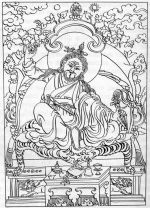Drel Chung Dön Sal Nyingpo
Drel Chung Dön Sal Nyingpo, Essence of Clear Meaning, A Short Commentary on the Sharp Vajra of Awareness Tantra (Wyl. shes rig rdo rje rnon po'i rgyud kyi 'grel chung don gsal snying po) is a commentary on the Sherik Dorje Nӧnpo Gyü Dzogchen tantra of Dudjom Lingpa, written by his major disciple Pema Tashi.
Description
The text belongs to the traditional Tibetan commentary called word-for-word commentary (Wyl. tshig ‘grel). Pema Tashi wrote at the beginning of the text[1]:
- This [treatise] is a uniquely marvelous sign that the time is ripe for meditative experiences and realizations due to the training of many previous generations in the unsurpassed Early Translation School, the Nyingma tradition, which is the essential Dharma of the swift path to Buddhahood in one lifetime. Here, I shall present to the best of my ability a concise commentary on the ‘Sharp Vajra of Awareness Tantra’, a synthesis of the quintessence of the great mystery of the Mantrayana, which correctly reveals the nature of Trekchö and of Tögal.
Alan Wallace wrote [2] that 'To effectively practice the instructions given in the Sherik Dorje Nӧnpo Gyü (‘Sharp Vajra of [Conscious] Awareness Tantra’), we must rely upon its detailed commentary, ‘Essence of Clear Meaning’. Dudjom Lingpa’s disciple Pema Tashi is the first-named requestor of the ‘Sharp Vajra of Conscious Awareness Tantra’ itself. Although he is considered the author of this commentary, his role in modern terms might have been closer to that of a compiler and editor.’ And[3] that ‘In the colophon, he described it as the memorized oral teachings of Dudjom Lingpa, which he set down into writing. The highly condensed teachings of the root tantra are explained with definitive verses from the sutras, tantras, and famous masters along with Dudjom Lingpa’s oral explanations and quotes from his teachings, especially the Enlightened View of Samanthabadra’ and the ‘Vajra Essence’.
According to the colophon of the text [4]:
- This pure vision of the great treasure revealer Lama Düdjom Dorje Trolö Tsal[5] is a set of Dharma teachings that arose from the treasury of space. This commentary to the Sherik Dorje Nönpo Gyü was taught to a few Dharma friends near the hermitage Drak Yangzong of the Second Buddha Orgyen [Padmasambhava]. On that occasion, the memorized oral teachings of the venerable, great treasure revealer Düdjom Dorje were held as supreme, and Pema Manga[6], with devotion for this foremost path, wrote them down so that they would not be forgotten.
Outline
Encapsulated in a three parts structure — (I) the meaning of the title; (II) the meaning of the text; (III) the colophon— the text follows the eight chapters’ structure of the Sherik Dorje Nönpo Gyü:
- The Meaning of the Title
- The Meaning of the Text
- Taking the Impure Mind as the Path
- Revealing Your Own Face as the Sharp Vajra of Vipashyana
- Revealing the Ground Dharmakaya
- Determining the Characteristics and Qualities of the Ground
- Determining Secret Dualistic Grasping and Revealing The Way of Natural Liberation
- Teachings on the Essential Points of Practice and Their Key Distinctions
- How to Follow the Path of the Great Clear Light, Direct Crossing Over
- How to Dwell in the Ground of Being
- The Colophon
Translations
- Alan Wallace, Dudjom Lingpa’s Visions of the Great Perfection, Wisdom Publications, 2015, volume 1, page 39-138.
Internal Links
Notes
- ↑ Alan Wallace, Dudjom Lingpa’s Visions of the Great Perfection, Wisdom Publications, 2015, volume 1, page 41.
- ↑ Alan Wallace, Dudjom Lingpa’s Visions of the Great Perfection, Wisdom Publications, 2015, volume 1, page 22.
- ↑ Alan Wallace, Dudjom Lingpa’s Visions of the Great Perfection, Wisdom Publications, 2015, volume 1, page 22.
- ↑ Alan Wallace, Dudjom Lingpa’s Visions of the Great Perfection, Wisdom Publications, 2015, volume 1, page 137.
- ↑ Lama Düdjom Dorje Trolö Tsal is a name of Dudjom Lingpa.
- ↑ Pema Manga is a moniker for Dudjom Lingpa’s disciple Pema Tashi, whose surname means “auspicious”
